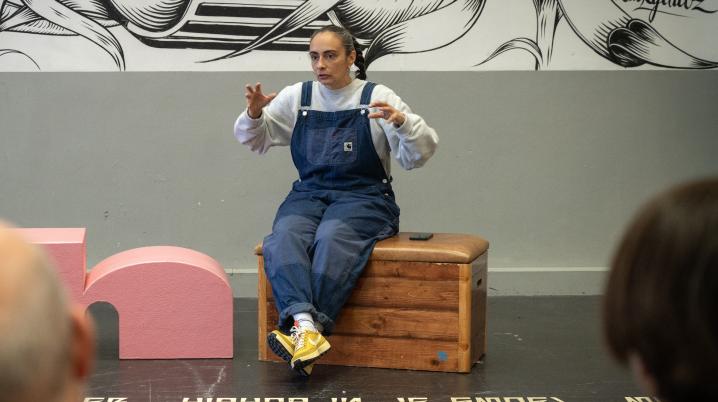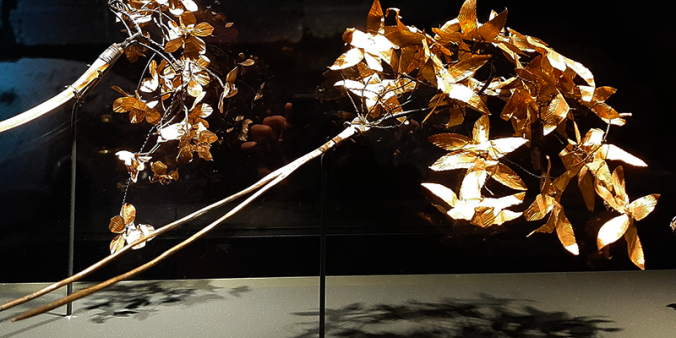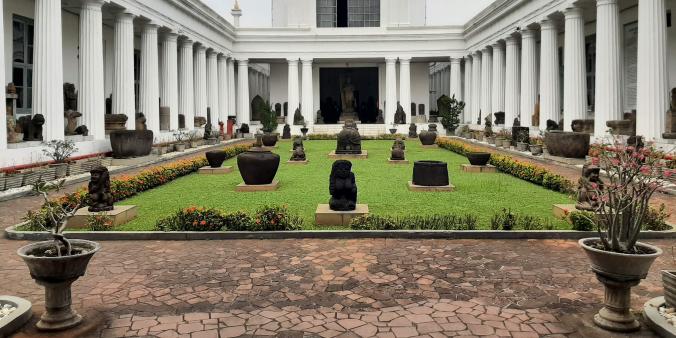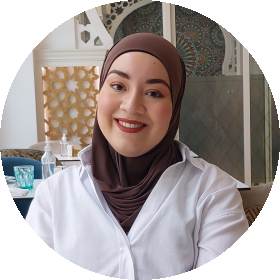
The yearly Embassy Culture Days brings together cultural attachés and officers from Dutch embassies and consulates around the world in the Netherlands, where they are updated on current developments in culture and policy. This year’s edition took place in The Hague and Rotterdam and revolved around the theme of ‘the Art of Changing Direction'. Our intern Rajae had the opportunity to be part of it and presents her personal experience.
Key policy developments
The programme was kicked off with an interactive get-to-know-each-other session, introduced by DutchCulture’s director Kirsten van den Hul. The atmosphere was filled with excitement as each person tried to position themselves in the lineup based on travel durations to The Hague. It turned out – not surprisingly - that the cultural attaché from Australia took the longest time to get to there, with the total travel time of over 20 hours. After this icebreaker, Secretary General at the Ministry of Education, Culture and Science Marjan Hammersma formerly welcomed the participants with a short speech about key policy developments.
One of these policy developments set the tone for the day: returning stolen cultural property. In her speech, Hammersma referred to the Dutch government's decision in July 2023 to return colonial collections to Indonesia and Sri Lanka. This agreement was signed in Leiden, later that month. These objects were wrongfully brought to the Netherlands during the colonial period. The decision to return them was made by Secretary of State for Culture and Media Gunay Uslu, after both countries asked The Netherlands to return the objects in 2022. It was special to hear this being mentioned again by Hammersma. After that, Van den Hul led a discussion about these developments with the Ambassador for International Cultural Cooperation Dewi van de Weerd and Director Erfgoed & Kunsten at the Ministry of Education, Culture and Science Christianne Mattijssen.
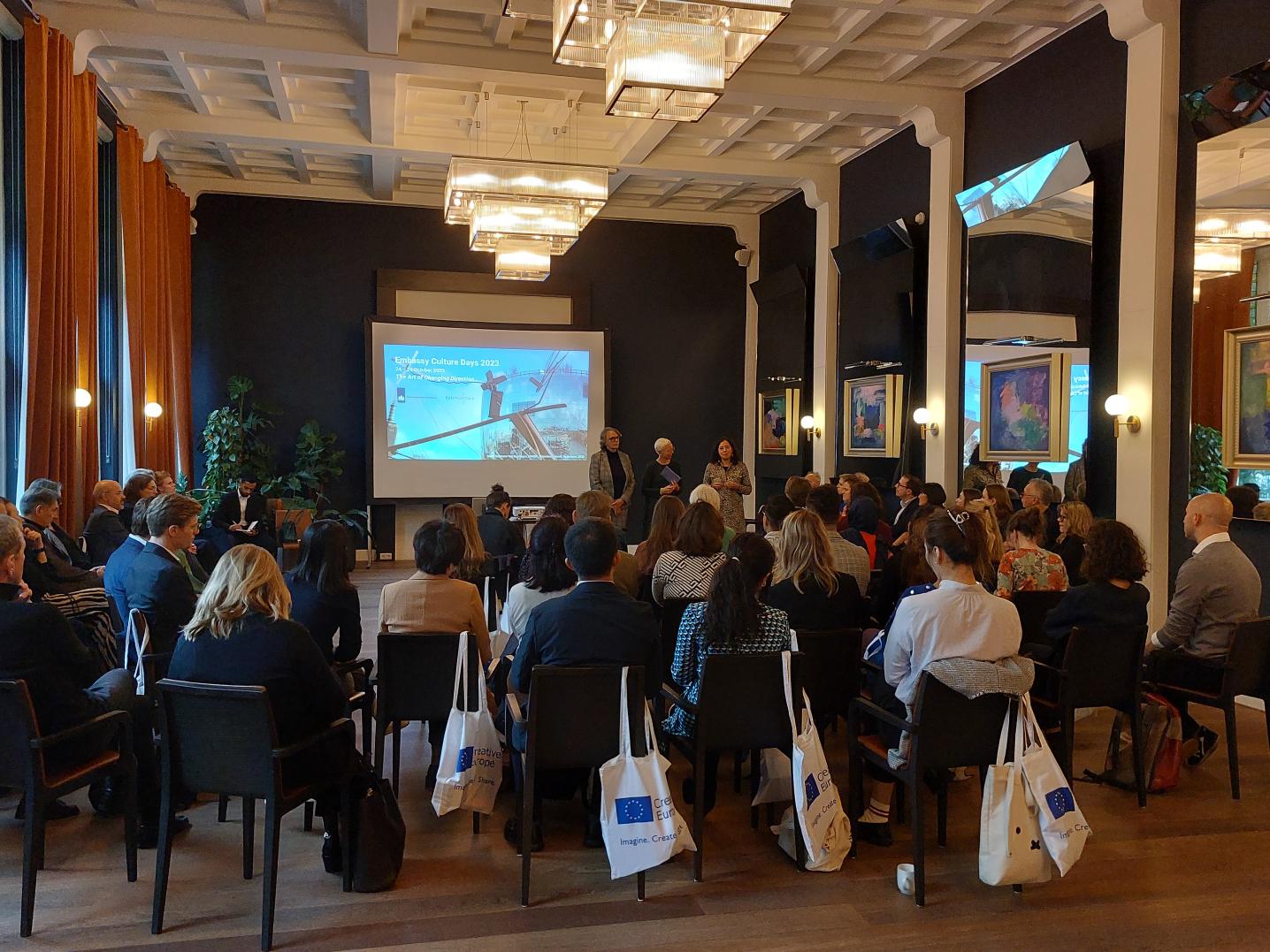
Colonial artifacts and Keti Koti
Van de Weerd highlighted that it is the Dutch policy to return artifacts: “Signing the agreement of returning artifacts in Leiden shows that we are making a change in the Netherlands.” During a work visit to Brazil in the first week of October, joined by Van de Weerd, this agreement led to an insightful conversation with Brazilian cultural policy makers. The Dutch approach inspired the Brazilian cultural policy makers, to which they shared their desire to do the same.
The importance of acknowledging past wrongs was highlighted during this panel discussion, where the speakers cited the King's apology for the Netherlands’ role in slavery during Keti Koti as their favourite cultural moment of the past year.” It was a special moment, we all screamed together and the people around me started crying after hearing the King apologize,” described Mattijssen. She emphasized the power of public apologies in bringing about healing and reconciliation, as well as the importance of cultural policies that address the legacy of slavery and colonialism.
As a student of African American history, what struck me most about this opening session was the realization that an increasing number of countries are engaging in conversations about the repatriation of stolen artifacts. Moreover, there is a rising awareness of and attention to the cultural heritage of ethnic minorities in the Netherlands. This signifies a positive international shift in recognizing the significance of preserving cultural history and the voices of marginalized communities. And according to Van den Hul, “it is necessary for the Dutch colonial past, including slavery, to be on the agenda. In other parts of the world, it is approached from a different perspective. That is why it is important to exchange these perspectives together.”
The Art of Changing Direction
Later on, cultural officers from South Korea and Australia presented on sustainability, climate change. Furthermore, special envoy for the Slavery Past/Suriname Frederique de Man led a talk on commemorating the slavery past, with contributions from Wendeline Flores, a conservator at Caribbean Region and Colonial History of the National Musuem of World Cultures. Next, Jessica Glendinning, the Policy Officer for Culture at the Netherlands Embassy and Consulate-General in South Africa, presented insights on exchanging cultural activities as a means of commemorating the history of slavery. She also emphasized the significance of addressing the aftermath. What followed was a lively and interesting conversation between the participants. “Promoting cross-cultural exchange of perspectives is crucial,” says to Van den Hul. “It enables individuals from nations where the past of slavery is not prioritized to witness first-hand that addressing this issue directly from the field is not only possible but also effective. This approach is preferable, compared to relying primarily on policy-driven approaches. Leveraging the power of diverse perspectives encourages collaboration and paves the way for innovative solutions that drive meaningful change on several levels.
Exploring art, culture, and innovation in Rotterdam
Unfortunately, I couldn’t be present at the second day of the whole event. But on the third day, the field visit at the city hall of Rotterdam was a special experience, with the welcome note by the mayor Ahmed Aboutaleb setting the tone for the day. His account of the building's history and its resilience during World War 2 was particularly fascinating, highlighting the city's sprit of resilience and strength. Two bullet holes in the frescoes stand as a testament to the building's remarkable story, emphasizing the importance of preserving cultural heritage for future generations. We concluded with a memorable group picture with mayor Aboutaleb.
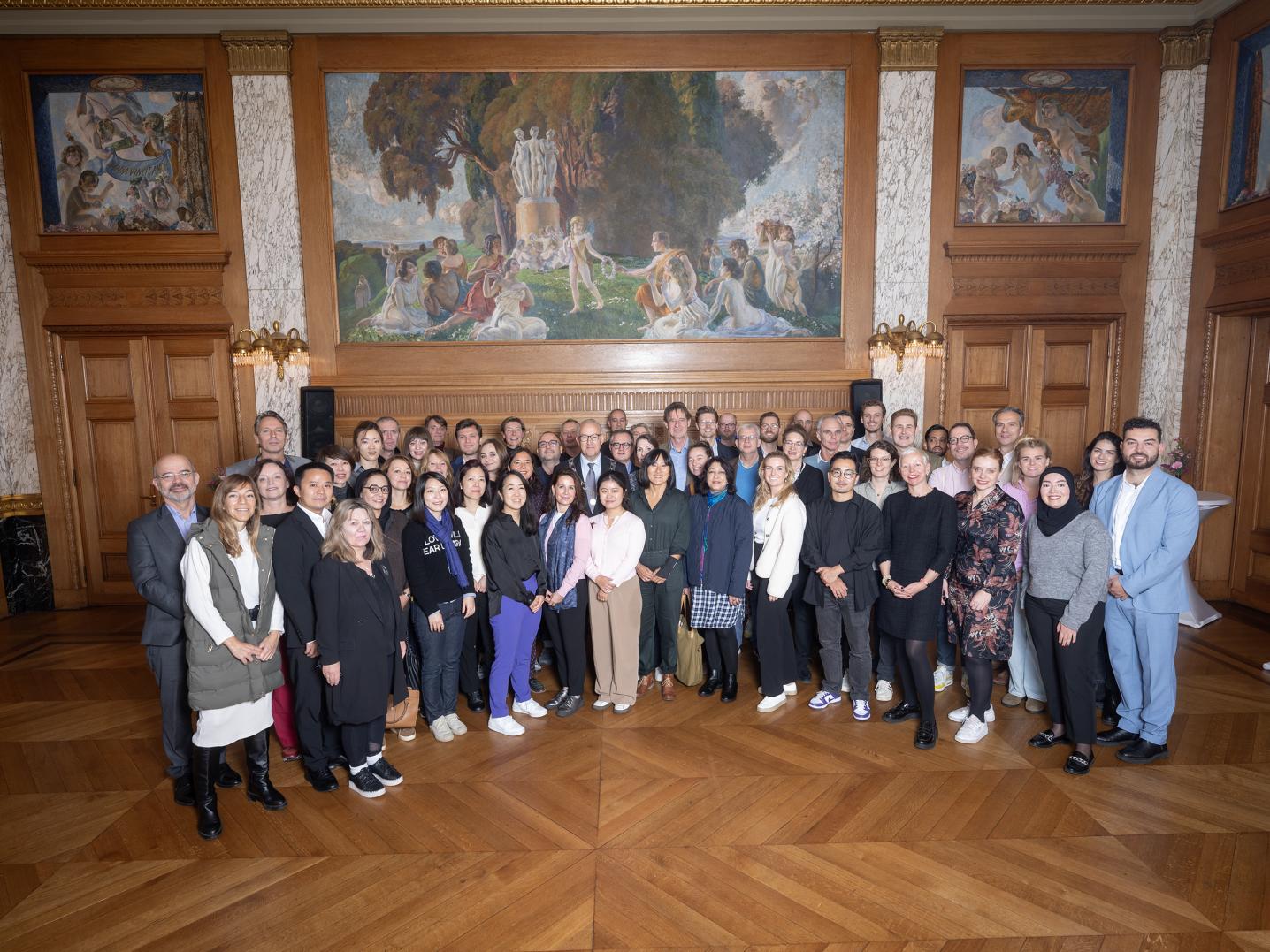
The cultural attaches were then split into groups for two work visits, with lunch at the Nieuwe Instituut Cafe in between. The excursions to the HipHopHuis and the Kunstinstituut Melly were extraordinary experiences. The HipHopHuis provides a safe space for individuals to explore and express themselves through music, dance, and art, positively impacting the youth and hip-hop community in Rotterdam. Meanwhile, the Kunstinstituut Melly is a fascinating art-house that presents and discusses contemporary art and theory, with a collective learning practice that spatializes and socializes different forms of knowledge.
From hip-hop hub to housing crisis
My interest was piqued by the HipHopHuis, which I found to be an extraordinary institution. Since its establishment in 2002, it has served as a hub for creativity and personal growth within hop-hop culture, providing a safe and welcoming space for individuals of all ages and backgrounds, including enthusiasts such as myself. Founder and director Aruna Vermeulen talked about the HipHopHuis' commitment to promoting hip-hop culture in Rotterdam by offering dance courses. I was particularly impressed by the presence of American hip-hop influences throughout the building, such as Salt-N-Peppa and Run-D.M.C. This invoked a strong sense of nostalgia that resonated with other members of our group. It was great to hear their stories reminiscing about the old-school turntables.
Next, we went to Nieuwe Instituut, an initiative that aligned perfectly with the Embassy Culture Days, exploring the intersection of design, architecture, and societal developments in addressing critical challenges like the housing shortage, climate crisis, and the emergence of artificial intelligence. The exhibits and discussions shed light on the latest trends and advancements in architecture and digital design, while lunch was the perfect opportunity to reflect on the day's experiences. Overall, these trips highlighted the beauty and importance of art and culture in shaping society and broadened the cultural attaches' understanding of innovation.
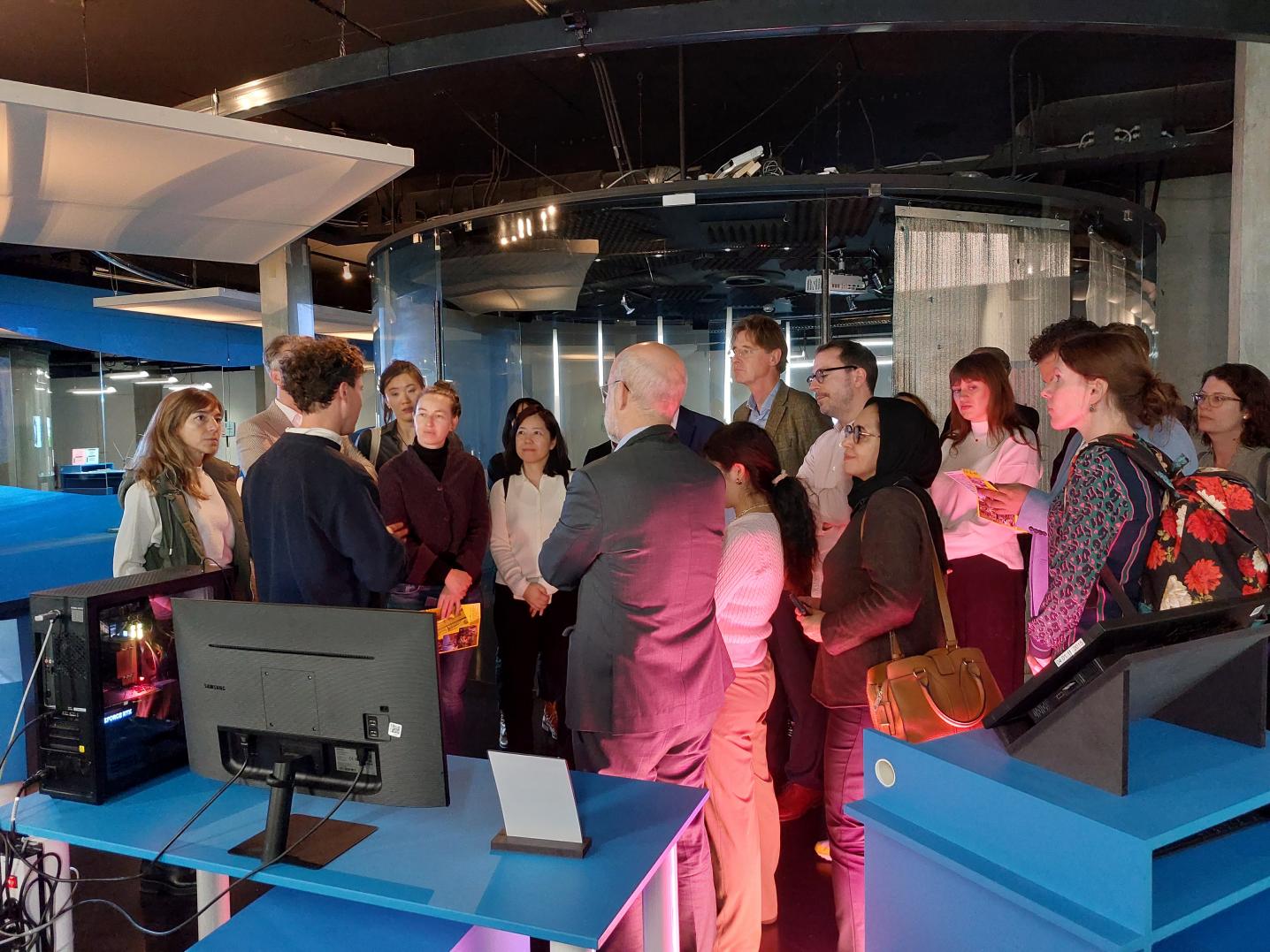
The Embassy Culture Days turned out to be a unique opportunity for cultural attaches and myself to connect with each other and and learn from many cultural experiences. HipHopHuis, Kunstinstituut Melly, and Nieuwe Instituut showcased the immense impact of talented individuals and organizations in the Dutch cultural sector, sparking conversations and challenging ideas. When asked about her key takeaway from the three-day event, Van den Hul responded, “I bring back newfound inspiration regarding forms of international cultural collaboration. We exchanged a lot about what works: from ‘fietsdiplomatie’ as a measure to promote climate action, to Loesje in Poland.” The event ended with drinks and bites at Depot Boijmans van Beuningen, providing a stunning view of Rotterdam as the perfect finale to an inspiring cultural experience!
